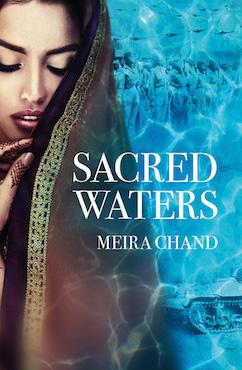
- Description
- Praise
- About the Author
-
Holding the child in the crook of her arm, her mother stood up and walked towards the river.
‘Where are you going?’ Sita yelled, filled by new confusion.
‘I must wash her clean,’ her mother replied.
Wading knee deep into the water, she lowered the child into the soft lapping swell, holding her there, caressing her tenderly all the while with her one free hand. For a moment Sita saw the child in her mother’s arms and the next she was gone, the tide lifting her free. Sita watched her float away, held briefly upon the rippling surface of the river before she sank slowly from sight, eyes open, a startled expression on her small face, uttering no cry of protest.
‘Amma!’ Sita screamed.
‘She was just a girl.’ Her mother spoke softly, her voice thick and strange.Orphaned as a child and widowed at thirteen, Sita has always known the shame of being born female in Indian society. Her life constrained and shaped by the men around her, she could not be more different from her daughter, Amita, a headstrong university professor determined to live life on her own terms. While trying to unravel the mysteries in her mother’s past, Amita encounters a traumatic event that would lead her down the path of self-discovery.
Unfolding simultaneously, their stories are set against the dramatic sweep of the early 20th century, from rural India to the chaotic Burmese battlefront to modern-day Singapore. Richly layered and beautifully evocative, the novel is a compelling exploration of two women’s struggle to assert themselves in male-dominated societies of both the part and the present.
-
“Chand proves herself a master of the modern Asian epic in this tale …she endows her characters with humanity and complexity, …grounding …their histories in solid research, and she offers a credible, compelling panorama of the tragedy and resilience, culture and individuality, political evolution, dissolution, and renaissance of 20th-century Singapore.”
— Publishers Weekly, starred review, September 2011
“…a panoramic page-turner…The epic sweep..[of]…this meticulously researched book is alive with engrossing detail…”
— The Guardian, October 2010"I am currently preoccupied by the search for information about the early lives of Indian women in Singapore. There is so little research done on the subject of women's lives in general and about Indian women's lives in particular. But often fiction such as Chand's Sacred Waters tells us more and enriches our understanding about what it is to be an Indian woman escaping India, from its oppressive traditional practices, as the protagonist does, to new challenges in a new world and culture, Singapore. From Chand's Sacred Waters and Su Chen Christine Lim's The River Song, I learnt far more than I would have reading research papers about the struggles of women and their social and cultural history in the first half of the 20th century. These stories capture the generosity of spirit, the dignity, the humanity of women living through hardships and poverty during an uncertain and dramatic period in our history."
—Constance Singam, writer and civil society activist, in "My Book of the Year 2019", Singapore Unbound -
Born and educated in London, Meira Chand is of Swiss-Indian parentage. She studied art at St Martin’s School of Art & Design and later taught art at an international school in Japan before turning to writing. She has a PhD in Creative Writing from the University of Western Australia.
Cover Type: Paperback
Page Count: 320
Year Published: 2017
Language: English
